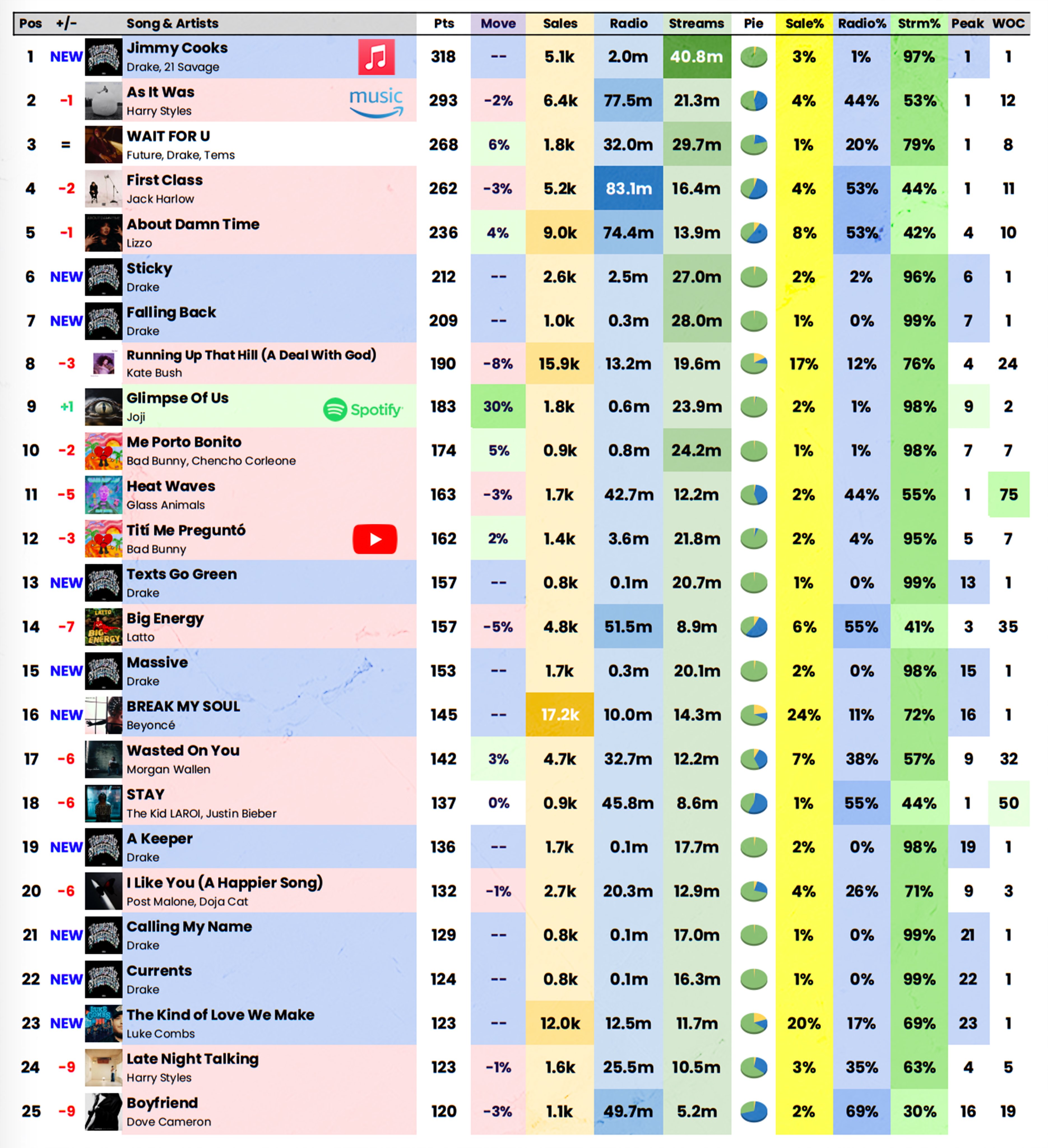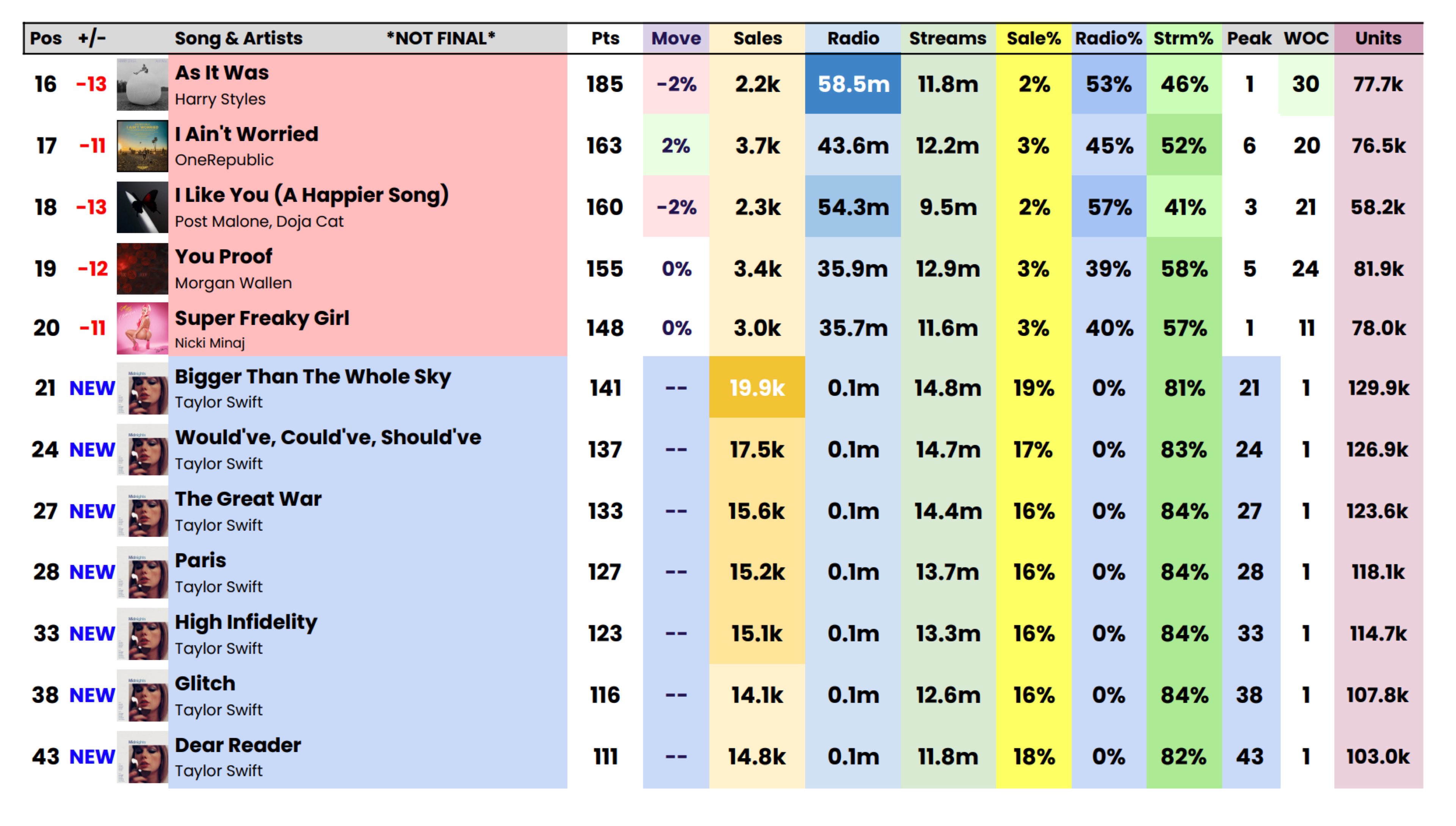Let's talk about the real deal here—music charts! If you're a fan of catchy tunes, unforgettable lyrics, or just plain old chart dominance, you're in for a treat. Talk of the charts is more than just numbers; it's a cultural phenomenon, a reflection of what the world is vibing to at any given moment. Whether it's Billboard, Spotify, or any other chart out there, the songs that dominate these lists have stories, legends, and sometimes even controversies behind them. So, buckle up, because we're diving deep into the world of chart-topping hits!
You know how sometimes a song just sticks in your head for days? Like, you can't escape it no matter how hard you try? That's the power of a chart-topping track. These songs aren't just hits; they're the soundtrack to our lives, our parties, and sometimes even our heartbreaks. But what makes a song go from zero to hero on the charts? Is it the artist's talent, the production value, or just plain good luck? Let's find out.
Here's the thing: talk of the charts isn't just about the numbers. It's about the impact, the influence, and the legacy these songs leave behind. From Taylor Swift's domination to BTS breaking records worldwide, there's so much more to unpack. So, whether you're a music enthusiast, a data nerd, or just someone who loves a good story, this article's got you covered. Let's get into it!
Read also:Good Ambler The Ultimate Guide To Embracing Your Inner Wanderlust
What Exactly Are Charts, Anyway?
Before we dive into the juicy stuff, let's break down what charts actually are. Simply put, music charts are rankings that show the popularity of songs or albums over a certain period. They're like a popularity contest, but with actual data to back it up. Platforms like Billboard, Spotify, Apple Music, and YouTube all have their own ways of calculating chart positions, but they all boil down to one thing: what people are listening to the most.
Now, here's the fun part—how do these charts work? It's not just about plays. For example, Billboard's Hot 100 takes into account streaming numbers, radio airplay, and even sales. Spotify, on the other hand, focuses more on streams and skips. So, if you're skipping through a song within the first few seconds, it might not count as a full stream. Crazy, right?
Why Do Charts Matter?
Charts matter because they're a reflection of what's trending in the music world. They give artists an idea of what's working and what's not. For fans, they're a way to discover new music and stay updated with the latest hits. But beyond that, charts have a cultural significance. Think about it—when a song tops the charts, it becomes a part of the global conversation. It's the talk of the town, the watercooler moment, the "talk of the charts," if you will.
Breaking Down the Numbers: How Songs Climb the Charts
Alright, let's talk numbers. How does a song go from zero to hero on the charts? It's not as simple as just releasing a good song. There's a whole process behind it. First off, an artist needs to have a strong fanbase. If people aren't streaming, downloading, or listening to the song on repeat, it's not gonna go anywhere. But it's not just about the fans—it's also about promotion, marketing, and sometimes even timing.
Take, for instance, a song like "Old Town Road" by Lil Nas X. It blew up not just because it was a bop, but because of the way it was promoted. TikTok played a huge role in its success, with millions of users creating videos to the song. Before you knew it, the song was everywhere, and it ended up breaking records on the Billboard charts. That's the power of a viral moment.
The Role of Social Media in Chart Success
Social media has completely changed the game when it comes to music charts. Platforms like TikTok, Instagram, and Twitter can make or break a song's success. Artists now use these platforms to engage with fans, promote their music, and even create challenges or trends around their songs. It's not just about the music anymore; it's about the experience.
Read also:Seaforth Landing Your Ultimate Guide To A Breathtaking Destination
But here's the thing—social media can also be a double-edged sword. While it can help a song go viral, it can also lead to controversies or backlash. Remember when a certain song got banned from the charts because of its genre? Yeah, that happened. So, while social media is a powerful tool, it's also a bit unpredictable.
The Artists Behind the Hits: Who's Making the Charts Move?
Now, let's talk about the people behind the hits. Who are the artists dominating the charts right now? It's a mix of old-school legends and new-school sensations. You've got Taylor Swift, who's been breaking records for years, and then you've got newer artists like Olivia Rodrigo, who came out of nowhere and took the world by storm. But what makes these artists so successful?
It's not just about talent—although that certainly helps. It's about consistency, innovation, and knowing your audience. Take BTS, for example. They started as a K-pop group with a small but dedicated fanbase, and now they're one of the biggest acts in the world. How did they do it? By staying true to their roots while also evolving with the times.
Biography: BTS—the Global Phenomenon
Let's take a closer look at BTS, shall we? Here's a quick rundown of their journey:
| Fact | Details |
|---|---|
| Founded | 2013 |
| Members | RM, Jin, Suga, J-Hope, Jimin, V, Jungkook |
| Debut Album | 2 Cool 4 Skool |
| Breakthrough Hit | Fire |
| Global Recognition | 2017 Billboard Music Awards |
From their humble beginnings in South Korea to selling out arenas worldwide, BTS has truly made a name for themselves. Their music speaks to fans across the globe, and their message of self-love and acceptance resonates with millions. It's no wonder they're one of the biggest names in the "talk of the charts" conversation.
Trends and Patterns: What's Hot Right Now?
So, what's trending in the music world right now? If you've been keeping up with the charts, you'll notice a few patterns. For one, pop and hip-hop continue to dominate the scene. But there's also a rise in Latin music, K-pop, and even Afrobeats. It's a melting pot of genres, and it's making the charts more diverse than ever.
Another trend we're seeing is the rise of independent artists. With platforms like SoundCloud and Bandcamp, artists no longer have to rely on major labels to get their music out there. They can create, produce, and distribute their music all on their own. It's a game-changer for the music industry, and it's giving fans access to a wider range of sounds.
Long-Tail Keywords: The Future of Music Charts
Now, let's talk about long-tail keywords. These are specific phrases or terms that people use when searching for music online. For example, instead of just searching for "top songs," someone might search for "best hip-hop songs of 2023" or "new K-pop releases." These long-tail keywords are becoming increasingly important in the world of music charts, as they help artists target specific audiences and niches.
The Impact of Music Charts on Society
Music charts don't just reflect what people are listening to—they also shape culture and society. When a song tops the charts, it becomes a part of the collective consciousness. It's played on the radio, used in commercials, and even covered by other artists. It's a cultural phenomenon that can influence fashion, language, and even politics.
Think about it—how many times have you heard a chart-topping song in a movie or TV show? Or how many times has a song inspired a dance craze or a meme? Music charts have a way of infiltrating every aspect of our lives, and that's what makes them so powerful.
Case Study: The Impact of "Despacito"
Let's take "Despacito" as an example. When it first came out, no one expected it to become the global sensation it did. But it ended up breaking records, winning awards, and even sparking a conversation about the representation of Latin music in the mainstream. It's a perfect example of how a chart-topping song can have a lasting impact on culture.
Challenges and Controversies: The Dark Side of Charts
Of course, not everything in the world of charts is sunshine and rainbows. There are challenges and controversies that come with the territory. For one, there's the issue of chart manipulation. Some artists and labels have been accused of buying streams or using bots to artificially inflate their numbers. It's a shady practice that undermines the integrity of the charts.
Then there's the issue of bias. Some critics argue that certain genres or artists are unfairly favored on the charts, while others are overlooked. It's a complex issue that requires transparency and accountability from the platforms that run the charts.
How Fans Can Make a Difference
But here's the thing—fans have more power than ever before. By streaming, sharing, and supporting their favorite artists, they can help influence the charts. It's a democratic process, and it gives fans a voice in the music world. So, if you love a song or an artist, don't be afraid to show it. Your support can make a difference.
The Future of Music Charts: What's Next?
So, what does the future hold for music charts? With the rise of AI, virtual reality, and other technologies, the possibilities are endless. We might see more interactive charts, where fans can vote for their favorite songs or create their own playlists. We might also see more emphasis on niche genres and regional charts, giving a voice to underrepresented artists and communities.
But one thing is for sure—the charts will continue to evolve, just like the music industry itself. It's an exciting time to be a music fan, and the "talk of the charts" will only get more interesting as we move forward.
Call to Action: Join the Conversation
So, what do you think about the world of music charts? Are there any songs or artists you're excited about? Let us know in the comments below! And if you enjoyed this article, don't forget to share it with your friends. The more we talk about the charts, the more we can shape the future of music.
Final Thoughts: The Power of Music
In the end, music charts are more than just numbers. They're a reflection of our culture, our values, and our shared experiences. Whether you're a fan of pop, rock, hip-hop, or anything in between, there's something for everyone on the charts. So, keep listening, keep discovering, and keep talking about the music that moves you. Because at the end of the day, that's what makes the "talk of the charts" so special.
And with that, we'll leave you with a little playlist to get you started. Happy listening!
Daftar Isi
- What Exactly Are Charts, Anyway?
- Breaking Down the Numbers: How Songs Climb the Charts
- The Artists Behind the Hits: Who's Making the Charts Move?
- Trends and Patterns: What's Hot Right Now?
- The Impact of Music Charts on Society
- Challenges and Controversies: The Dark Side of Charts
- The Future of Music Charts: What's Next?
- Final Thoughts: The Power of Music


